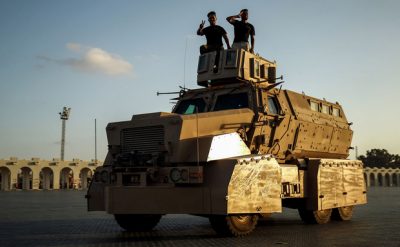Turkish-backed GNA Leader Fayez al-Sarraj Is on the Verge of Losing Tripoli

Italy, Russia and Turkey have been pressing for an end to the war in Libya between the Parliament-backed Libyan National Army (LNA) and the Turkish-backed Muslim Brotherhood Government of National Accord (GNA) in Tripoli. Pressure to put an end to the LNA offensive was received by General Khalifa Haftar, who continues to advance on jihadist forces loyal to the GNA, after Turkish President Recep Tayyip Erdoğan and Russian President Vladimir Putin made a joint statement to “declare a sustainable ceasefire, supported by the necessary measures to be taken for stabilizing the situation on the ground and normalizing daily life in Tripoli and other cities,” with the ceasefire to begin at midnight on Sunday. The Libyan general also had a private meeting on Wednesday with Italian Prime Minister Giuseppe Conte, who called on Haftar to order the cessation of military action, as according to Conte, the only viable solution is a political solution.
Although the LNA’s efforts to liberate Libyan territory from the GNA began in April, it slowly grinded down to a halt and stalemate. However, Erdoğan in a gross miscalculation that left him isolated and with no international support, set tensions in the Eastern Mediterranean alight when him and GNA leader, Fayez al-Sarraj, an ethnic Turk himself, signed a Memorandum of Understanding in late November 2019 that redrew maritime borders that massively infringed on Greece’s maritime space.
Haftar took every advantage of the renewed tensions between Turkey and Greece and successfully swayed Athens to withdraw relations with the internationally recognized GNA and back the LNA. This was important as Greece became the first NATO and EU member to openly back the LNA, sparking a new offensive by the LNA against the GNA. Since the signing of the memorandum between Erdoğan and Sarraj, Egypt has not only provided weaponry and equipment to the LNA, Cairo has threatened to attack Turkey if it involves itself in Libya just as the United Arab Emirates continues to conduct airstrikes against the GNA.
The LNA with renewed and strengthened international support just days ago liberated the symbolic city of Sirte, the birthplace of Libya’s historic leader, Muammar Gaddafi. This is a major blow as the LNA has now also officially reached Tripoli and is only a few kilometres from the center of Libya’s capital. The simultaneous operations have meant that the GNA, whose forces just days ago beheaded an LNA scout in similar fashion to ISIS barbarity, is not only feeling pressure in the capital, but LNA forces have continued their offensive beyond Sirte and are now only 100 kilometers from Misrata. This will surely divide GNA forces considering many of the militias fighting in Tripoli on the side of the GNA are originally from Misrata, the first major city to fall during the NATO-backed destruction of Libya in 2011.
Saraj had contacts with top European Union officials this week, who also called for an end to armed violence, however they failed to convince Haftar to end military operations. Turkey has already sent military supplies, military advisers and Syria-based jihadists to Libya. Any ceasefire will only allow GNA forces to regroup and resupply while the LNA would lose its momentum with the massive advances they are currently making.
Russia has little influence over the LNA and there is no incentive for the LNA to accept the ceasefire. In Syria, Russia has strongly supported Damascus economically and militarily, while Turkey has supported jihadist groups. However, Syria is not Libya, with the LNA relying on Egypt, Saudi Arabia and the United Arab Emirates. It is for this reason that Haftar has unconditionally rejected the call for a ceasefire as they have vowed to defeat Turkish-backed forces unconditionally. The LNA is more heavily reliant on air support and intelligence from the Abu Dhabi, and material support and intelligence from Egypt and Saudi Arabia.
Putin, despite making the joint statement for a ceasefire with Erdoğan, likely would have known the LNA were going to reject the ceasefire request. It is likely that Putin did so as an act of good will to preserve the strengthening Russian-Turkish economic and cultural relations just as the Turkstream pipeline was inaugurated on Wednesday. Therefore, Putin made the call for a ceasefire knowing full well it would be rejected. As the LNA continues to approach Misrata, it is likely the militias originally from Misrata will leave Tripoli for their own hometown, further weakening the GNA’s defences in Tripoli, which will lead to the LNA liberating the capital city. Haftar will not surrender his advantage for a ceasefire with forces who are serving Turkish interests and behead their soldiers in an ISIS-like fashion.
*
Note to readers: please click the share buttons above or below. Forward this article to your email lists. Crosspost on your blog site, internet forums. etc.
This article was originally published on InfoBrics.
Paul Antonopoulos is a Research Fellow at the Center for Syncretic Studies.

